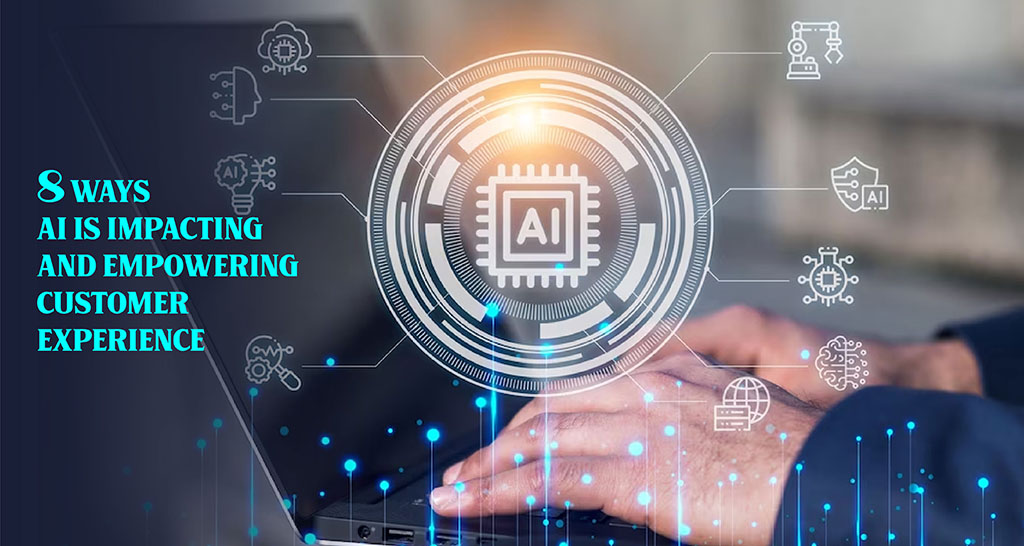Artificial intelligence has a significant impact on every facet of modern business. Today, businesses actively use artificial intelligence to empower their decision-making process, organize and analyze data, and stay one step ahead of their competitors. In addition, AI can also be used to enhance and expedite the customer experience.
It will enable you to boost your lead generation, reduce friction in the buyer journey, and, at the same time, accomplish your sales target. There are numerous ways AI can be used to enhance the customer experience (CX).
The more we understand AI’s potential, the more we see that contrary to what many believe, it will replace human employees and creativity, rather than a vital component. This also applies to customer service representatives, who will be able to do their duties more effectively than they ever could have in the past because of artificial intelligence (AI). Artificial intelligence (AI) has been integrated across several industries, allowing marketers to transform how they interact with consumers completely. Everyone in the company, from customer care to marketing, is curious about how artificial intelligence will impact their work.
In this article, we will delve into the specifics of the AI customer experience. How does AI help to provide seamless, streamlined, and tailored customer support as the world grows?
Eight ways AI enhances the customer experience
- Using behavioral segmentation to target marketing and products
Artificial intelligence is excellent at finding hidden patterns. It can analyze millions of data points from numerous sources, including social media and review websites. This is how they enable you to fine-tune segmentation to the extent that you wish to, going beyond traditional demographic preconceptions (like all the customers are ladies). These insights help you create more personalized goods and services as well as more successful targeted marketing initiatives.
- Using predictive analytics to predict the behavior of future customers
By using machine learning, predictive analytics extracts insights from data analysis—both internal (sales and customer) and external (current events, competition data, reviews, and social media comments).
These are essential for spotting market trends and providing guidance when making decisions about marketing expenditures, inventory management, and other investments. It is a major part of your business; if you know what people are looking for, you can easily tackle their demands.
- Changes in prices as per demand
The price of a product or service changes. There is no surprise since dynamic pricing does happen in sectors like tourism and hospitality, where seasons (weekends or weekdays) and changing customer demand (like the popularity of a place or flight) are factors.
Artificial intelligence (AI) algorithms can easily find highly relevant, time-sensitive insights from both historical and real-time data (e.g., inventory, demographic-based sales, rival pricing, and social media posts). Companies can easily use this data to proactively customize their product price and marketing accordingly, which will help the company become more competitive and reach the targeted audience.
- Sentiment analysis to understand clients’ thoughts
Sentiment analysis provides you with specific negative and positive metrics on a topic or part of your business, allowing you to determine what aspects of your brand are liked and disliked by consumers. Social media sentiment research, for instance, can help a health system determine which areas of its operations patients find satisfactory and which need improvement. Sentiment analysis can thus pinpoint the elements influencing your brand loyalty, client retention rate, and image.
- Customize content and improve consumer interaction.
One of the most promising uses of AI is leveraging content recommendation engines to increase personalization.
With the help of AI technologies, you can customize and optimize your content for optimum impact by using customer-specific information from purchase histories, website behavior (searches, scrolls, and clicks), and comments to predict what they would be interested in.
You can also greatly increase customer response rates and promote consumer interaction with personalized, pre-approved suggested replies utilizing technologies.
- Using image recognition to examine visual materials
Visual AI systems explore search histories, spot trends in visual content, and offer customized recommendations for new or improved designs. This capability is revolutionary since it makes sentiment analysis of videos just as simple as it is for textual data. You can use videos on sites like TikTok, Instagram, and YouTube to gauge consumer sentiment and perform competitive analysis on rival brands. This AI technique will enable your business to connect with your audience emotionally and influence them effectively.
- Better customer support with Chatbot
Staying available 24*7 to support customers requires a lot of money and one personal consultant available all the time. By automatically creating responses based on predetermined parameters, natural language processing (NLP) enables virtual agents and chatbots to understand conversational language and reply to clients.
The best part is that AI-driven algorithms can recognize client difficulties more readily than rule-based chatbots since they can comprehend semantics. They may also suggest subsequent actions, such as guiding the customer to a live agent.
- Voice search for improved user experience and search engine ranking
AI-based voice search optimization helps you rank higher in voice search results by making improvements to your website’s content and structure. Similarly, to improve customer service effectiveness, AI is assisting in the replacement of laborious interactive voice recording (IVR) technologies with intelligent voice automation.
Bonus Point: What are the Advantages of AI in Business?
The above eight ways clearly show that AI has a significant role to play in the customer service segment. For a better understanding, let’s check through the key advantages of AI in business:
- AI-Assisted Customization: Personalized interactions are one of the most important ways artificial intelligence is improving the customer experience. By utilizing AI algorithms to analyze large volumes of consumer data, organizations may obtain profound insights into the unique tastes, behaviors, and demands of each client. Because of the abundance of information available, firms may customize their goods, services, and marketing strategies to meet the specific needs of their target audience. Deeper customer connections and hashtag customer trust are driven by AI-powered systems that provide personalized recommendations, content, and offers.
- Analytics and insights Predictive: Using predictive analytics is one of AI’s key advantages in customer experience management. Artificial intelligence (AI) systems are able to spot patterns, trends, and correlations in historical data that humans would miss. This makes it possible for brands to proactively intervene by anticipating client behavior, preferences, and possible issues. Businesses may improve their product development, marketing strategies, and inventory management using AI-powered hashtags, helping them to stay ahead of the competition and effectively satisfy customer needs.
- Seamless Customer Service: Artificial intelligence (AI) has completely changed the customer service landscape; it offers intelligent, automated solutions that can handle a variety of questions and problems. With natural language processing (NLP) capabilities, chatbots and virtual assistants can comprehend client inquiries and deliver precise answers instantly. In addition to cutting down on client wait times, these AI-driven support solutions guarantee 24/7 availability, constant service quality, and quicker problem-solving.
- Data-Based Decision Making: A significant part of developing an AI-driven customer experience strategy is data gathering and analysis. Brands can collect and evaluate enormous volumes of consumer data to produce insights that can be put to use by combining artificial intelligence (AI) with customer relationship management (CRM) systems. These insights enable companies to enhance their product offerings, optimize pricing models, hone marketing efforts, and make data-driven decisions. Brands can use AI to find hidden trends and make strategic decisions that suit the tastes and expectations of their target audience.
- Increased Interaction with Customers: Voice assistants, recommendation engines, and personalized chatbots are just a few examples of the AI-powered technologies that have completely changed how businesses interact with consumers. Voice-activated technologies, such as smart speakers, facilitate seamless brand interaction by allowing users to make purchases or retrieve information using voice requests. Utilizing client data to offer tailored recommendations, recommendation systems driven by AI.
- Enhanced cross-selling and upselling prospects: Stronger consumer relationships and increased brand loyalty are fostered by these technologies’ creation of immersive and engaging experiences.
Final Thought
So these are the eight ways AI affects customer service operations in a business. It enables companies to understand their customers well and come up with personalized support. It also helps to produce complex analytics of the customer journey, streamline customer interactions, convey important messages, and raise customer engagement. With so many advantages, one of the major questions that usually comes to mind is: will AI replace us as our new superpower or become it? There is no doubt that AI offers us a glimpse of a bright future where artificial intelligence (AI) is used to create new service levels and expand customer options.
Still, creating happy and unforgettable client experiences will always require a human touch, empathy, and emotional intelligence. So in the near future, customer service will be greatly enhanced by fusing these human components with the greatest AI and related technology has to offer.







